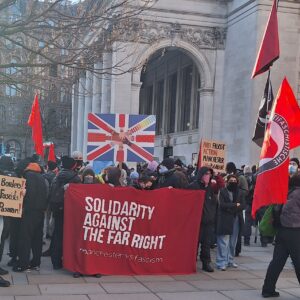On 5 June the leadership of the Public and Commercial Services union (PCS) leadership announced that the government had made “significant concessions relating to pay, redundancy terms and job security” as a result of the industrial action members had been taking.
These supposed concessions are
- a £1,500 bonus
- an increase of 4.5%, with an extra 0.5% for the lowest paid
- A commitment to avoiding compulsory redundancies
The last is nothing new; it is a meaningless commitment which is always in place. The figure of 4.5% was one previously stated by the Treasury for 2023/2024 pay year – so only the 0.5% is in any sense new. The bonus, like those offered in other industries, will not be consolidated into pay levels on an ongoing basis and further will be funded out of existing Departmental budgets.
There is no national pay bargaining in the civil service. the pay talks revolve around how to share out the 4.5% increase across all staff. No one is guaranteed a 4.5% increase. Previously Departmental pay teams were told not to engage in discussion around the 2023/2024 pay offer. This injunction has now been lifted and pay negotiators have been told once agreement is reached on the bonus pay talks can begin. In a number of Departments, the pay talks revolve around how to share out the 4.5% increase across all staff. No one is guaranteed a 4.5% increase
The ongoing ballot for strike action within the DWP was suspended. In the original ballot in November 2022 the DWP just scraped past the 50% threshold and then in the reballot made necessary by anti-union laws, the threshold was missed. This was a reballot to try and get over the threshold. HMRC was also due to reballot, this has also been suspended.
The union claims they have won massive concessions in the biggest victory for the union for many a year. The reality is that there are many low paid staff in departments like DWP and HMRC who are on the national minimum wage and many people who are entitled to Universal Credit. This deal does absolutely nothing for them. And then there are the rest of us who have faced pay freezes or miniscule increases of 1% or 2%.
The union’s NEC is due to meet again in early July to review its position and decide on next steps. A number of branches have come together in the ‘PCS says No’ campaign to oppose the apparent intention of the NEC to abandon the current dispute.
Art (54) Book Review (127) Books (114) Capitalism (68) China (81) Climate Emergency (99) Conservative Government (90) Conservative Party (45) COVID-19 (46) EcoSocialism (60) Elections (83) Europe (46) Fascism (62) Film (48) Film Review (68) France (72) Gaza (62) Imperialism (101) Israel (129) Italy (46) Keir Starmer (56) Labour Party (113) Long Read (42) Marxism (49) Marxist Theory (47) Palestine (181) pandemic (78) Protest (153) Russia (343) Solidarity (150) Statement (50) Trade Unionism (144) Ukraine (351) United States of America (139) War (370)
Latest Articles
- A New Year mystery: Your Party’s ‘grassroots left’ and the ecosocialist elephantThe Grassroots left slate for the Your Party CEC has one glaring ommission, argues Allan Todd
- Manchester against the far rightRecent years have seen a vast shift and normalisation in anti-migrant sentiment and prejudice, to the shock and horror of many people across Britain writes Joshua Cole
- The EHRC’s Trans Guidance – Chaos and Confusion The Equality and Human Rights Commission guidance on trans rights has provided clarity to no one but its own ideologists, writes Rose.
- The Return of the Mask – Superflu and CovidCovid-19 persists, but the world fails to confront it. Joseph Healy takes on the pandemic.
- ICE – An Occupying ForceSimon Pearson on the killing of Renee Nicole Good in Minneapolis yesterday






